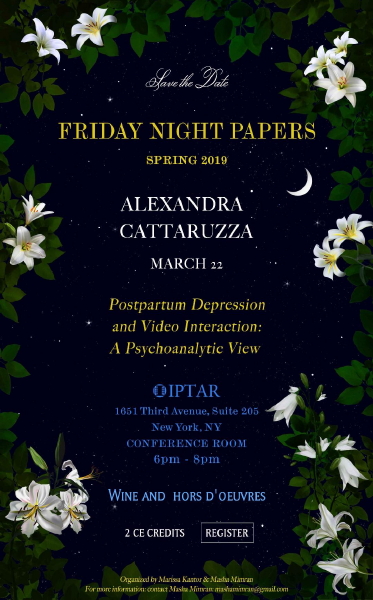
“Postpartum Depression and Video Interaction: A Psychoanalytic View.” Alexandra Cattaruzza M.S., L.P., FIPA
Postpartum depression is a phenomenon that affects ten to forty percent of women worldwide. It is the most common complication of pregnancy and can have profound and long lasting negative consequences for mother and child. This disorder is usually underreported due to the stigma associated with it, and very frequently goes undiagnosed and untreated. It is typically treated with medication, but since the effects of psychotropic drugs are largely unknown, finding effective psychotherapeutic techniques to prevent and treat it is essential. The demands of pregnancy include a reprocessing at a psychic level of the earliest relationships, especially the one with the mother, and shifts in identity, body image and self and object representations, as well as a renegotiation of object relations. Psychoanalytic treatment of postpartum depression presents a challenge to the clinician since there is great variability in its symptomatology, onset and course and there are numerous tasks that need to be accomplished in a short period of time. The use of psychoanalytically informed video microanalysis and intervention, providing feedback and psychoeducation as well as utilizing the EPDS and PBQ to track progress, can be a valuable technique to effect change.
Alexandra Cattaruzza M.S., L.P., FIPA
Alexandra Cattaruzza M.S., L.P., FIPA is a Licensed Psychoanalyst in private practice in New York City. She is faculty and supervisor in the Child and Adolescent, and Adult Programs at Metropolitan Institute for Training in Psychoanalytic Psychotherapy and the Program in Psychoanalysis of the Harlem Family institute, as well as supervisor for the clinical center of the Institute for Psychoanalytic Training and Research. She has taught seminars and workshops on the topics of pregnancy, postpartum depression and parent-infant interaction and in 2014 authored a paper entitled “Difficulties in the Treatment of Depression During Pregnancy and Postpartum Depression” published by JICAP.She was co-Chair of Scientific Meetings for MITPP and former Associate Clinical Director of the Harlem Family Institute.
Alexandra is also a Ph.D. candidate at the Los Angeles Institute and Society for Psychoanalytic Studies and holds a certificate in adult psychoanalysis from the Institute for Psychoanalytic Training and Research. She is also a graduate of the Anni Bergman Parent-Infant Training Program, joint program between the Contemporary Freudian Society and the Institute for Psychoanalytic Training and Research. Additionally she holds a Certificate in Child and Adolescent Psychotherapy from the Metropolitan Institute for Training in Psychoanalytic Psychotherapy, a certificate in Creative Arts Therapies from New School University and a Diploma in Child Psychological Assessment from Universidad El Bosque. She has a degree in psychology from Universidad de los Andes.
Learning Objectives
1) Gain an understanding of postpartum depression and its effects on mother and child.
2) Identify the current treatments for postpartum depression.
3) Explain the use of video interaction and how it can help in the treatment of postpartum depression.
Teaching Method:Lecture and Discussion
Social Workers: The Institute for Psychoanalytic Training and Research, Inc. (IPTAR) SW CPE is recognized by the New York State Education Department’s State Board for Social Work as an approved provider of continuing education for licensed social workers #0226.
Licensed Psychoanalysts: The Institute for Psychoanalytic Training and Research (IPTAR) is recognized by the New York State Education Department’s State Board for Mental Health Practitioners as an approved provider of continuing education for licensed psychoanalysts (P-0011).
Licensed Creative Arts Therapists: The Institute for Psychoanalytic Training and Research (IPTAR) is recognized by the New York State Education Department’s State Board for Mental Health Practitioners as an approved provider of continuing education for licensed creative arts therapists (#CAT-0037).
(2) CE credits will be granted to participants who have registered, have documented evidence of attendance of the entire program and have completed the on-line evaluation form. Upon completion of the evaluation form a Certificate of Completion will be emailed to all participants who comply with these requirements.
25.00 CE & General Admission Ticket
